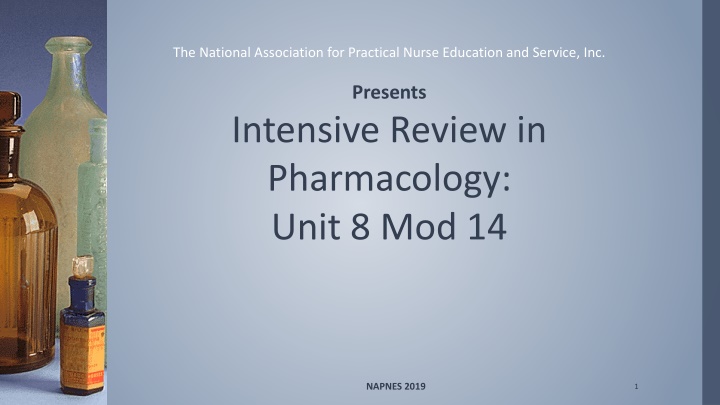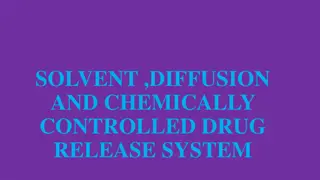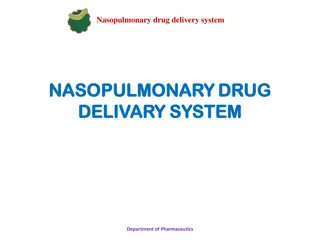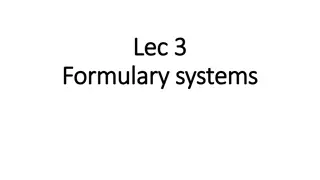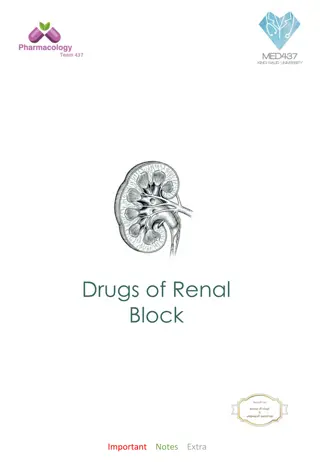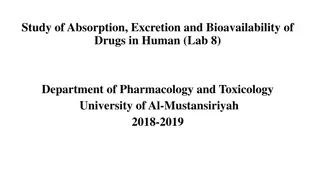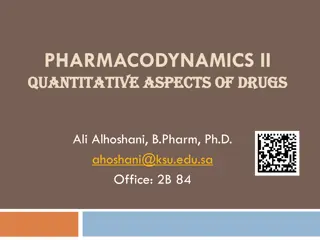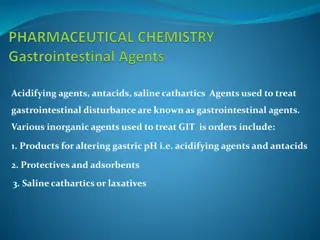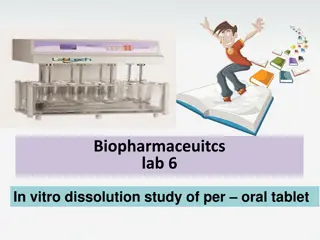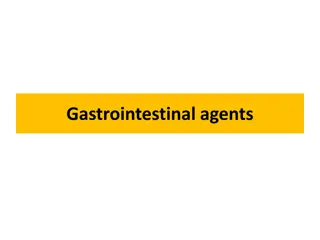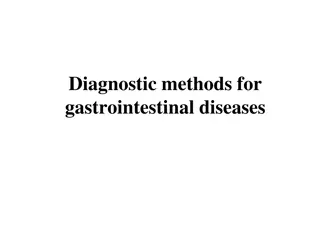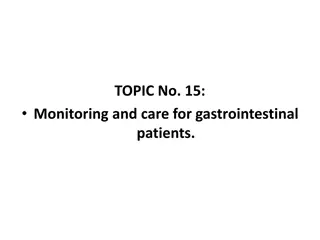Drug Therapy for Gastrointestinal System: Overview and Considerations
Drug therapy affecting the gastrointestinal system covers a range of medications aimed at treating conditions such as hyperacidity, peptic ulcers, gastritis, and more. From antacids to proton pump inhibitors, these medications play a vital role in managing gastrointestinal issues. Understanding the different types of drugs, their mechanisms of action, and potential side effects is crucial for healthcare professionals involved in gastroenterology care. Antidiarrheals, laxatives, and antiemetics are also integral components of this treatment approach.
Download Presentation

Please find below an Image/Link to download the presentation.
The content on the website is provided AS IS for your information and personal use only. It may not be sold, licensed, or shared on other websites without obtaining consent from the author.If you encounter any issues during the download, it is possible that the publisher has removed the file from their server.
You are allowed to download the files provided on this website for personal or commercial use, subject to the condition that they are used lawfully. All files are the property of their respective owners.
The content on the website is provided AS IS for your information and personal use only. It may not be sold, licensed, or shared on other websites without obtaining consent from the author.
E N D
Presentation Transcript
The National Association for Practical Nurse Education and Service, Inc. Presents Intensive Review in Pharmacology: Unit 8 Mod 14 NAPNES 2019 1
Drug Therapy Affecting Gastrointestinal System NAPNES 2019 2
GI SYSTEM MEDICATIONS Antacids Histamine blockers Proton pump inhibitors Other drugs for treatment of hyperacidity Antidiarrheals Laxatives Antiemetics NAPNES 2019 3
GI SYSTEM MEDICATIONS Antacids/Antiflatulence Neutralize stomach acids Used to treat hyperacidity RT peptic ulcer, gastritis, hiatal hernia Three types Aluminum salts Calcium salts Magnesium Side effects Aluminum antacids are associated with constipation Calcium salts may lead to kidney stones Magnesium antacids are associated with diarrhea Combination drugs available now that minimize effects of single agents NAPNES 2019 4
GI SYSTEM MEDICATIONS H2 Antagonist Reduce stimulation of acid secretion Used to treat gastric/duodenal ulcers, GER, Upper G.I., Bleeding, hypersecretory conditions Can be purchased OTC Pepcid (famotidine) Tagamet (cimetidine) Axid (nizatidine) Zantac (rantitidine) Side Effects - low incidence of side effects that include CNS: h/a, lethargy, confusion, depression, slurred speech Endocrine: Impotence, <libido, .prolactin, gynecomastia G.I.: G.I. Upset, jaundice G.U.: Increased BUN and creatinine Integumentary: Rash, uticaria, alopecia, sweating, flushing Interactions some function as enzyme inhibitors NAPNES 2019 5
GI SYSTEM MEDICATIONS Proton Pump Inhibitors Prilosec (omeprazole) Totally inhibit production of acid Erosive esophagitis GER that is unresponsiveness to traditional therapies Duodenal and active benign gastric ulcers Most common side effects is abdominal pain. Other Agent for Treatment of Hyperacidity Carafate (sucralfate): A cytoprotective agent that is used in the treatment of stress ulcers, erosion, and peptic ulcer disease. NAPNES 2019 6
GI SYSTEM MEDICATIONS Antidiarrheals Types Absorbents: Bind to bacteria/toxin and eliminate it from the body Anticholinergics/Opiates: Decrease peristalsis slowing movement of substances through G.I. Tract Intestinal Flora Modifiers: Help restore balances of normal flora and suppress overgrowth of diarrhea causing bacteria Examples Activated charcoal, Pepto-bismol (bismuth subsalicylate) Conninex (belladonna alkaloid), Imodium (loperamide) Lactinex (lactobacillus acidophilus) Side effects vary according to the class NAPNES 2019 7
GI SYSTEM MEDICATIONS Laxatives Promote passage of fecal material from G.I. Tract Bulk forming - Metamucil Emollient - Mineral oil Hyperosmotic - Fleet Saline - Milk of Magnesia Stimulant - Dulcolax Softeners - Colace Used for constipation and preparation for radiologic and surgival procedures Side-effects Impaction, fluid-overload, malabsorption, abdominal bloating, skin rashes NAPNES 2019 8
GI SYSTEM MEDICATIONS Antiemetics Actions Decrease hypermotility Depress vomiting centers in medulla Examples Transderm- Scop (scolpolamine) Dramamine (dimenhydrinate) Compazine (prochlorperazine) Reglan (metoclopramide) Side effects relate to the specific class of medication NAPNES 2019 9
Nursing Considerations Administer other meds 1 to 2 hours after antacids Antacids cause premature dissolving of enteric coated meds Avoid caffeine, harsh spices, alcohol, may aggravate condition Increase fluid and fiber to decrease need for laxative Long-term laxative use may lead to dependency Do not take if experiencing nausea, vomiting, and/or abd. Pain Antiemetics may cause drowsiness therefore avoid hazardous activities Avoid CNS depressants and alcohol when taking antiemetics Monitor hydration status of clients requiring antiemetics NAPNES 2019 10
The National Association for Practical Nurse Education and Service, Inc. Acknowledges Benita Vaughns, RN, MSN For her professional work in creating this slide presentation. NAPNES 2019 11
